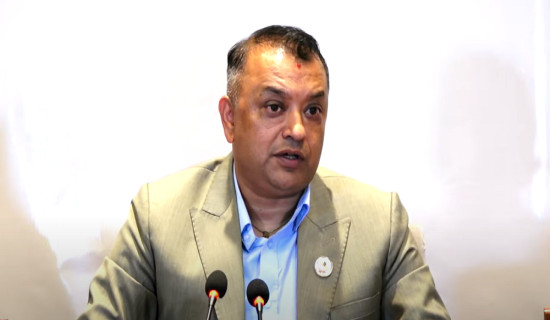- Friday, 20 February 2026
Let Women Take Leadership Roles
I've never known the identities of any solitary female farmers, and it has always made me feel powerless to watch them working in a field by themselves. As a woman in a patriarchal society and a resident of the Terai area of the nation, I have witnessed women take care of the house by themselves. Also, I have direct experience with the way society rejects women just for being female. My memory is that males have always been the social leaders in their homes. The source of this manly power, though, is unknown to me.
Who establishes the social order that gives them power? Why then do we unquestioningly think that males are the ones with all the influence and power? I've always been troubled by acts of violence, prejudice, unfairness, exclusion, marginalisation, and stigmatisation that women experience, and I've always pondered what might be done to make our society a better place for women to live.
Passionate
For me, having control over one's own home and interpersonal connections is more significant than having influence over one's society. Since I'm a girl, I'm usually very passionate about topics pertaining to women. Women may be empowered, in my opinion, by just being encouraged and supported. I believe that any woman who advocates for her rights does so on behalf of all other women, and that everyone benefits when their voices are heard. It shows the little girl's developing "can-do" attitude.
As far as I'm aware, women's lack of financial means is what prevents them from having a say in the house. That does not, however, imply that resources are not easily accessible in contemporary culture. It emphasises how women in our culture are given opportunity, rights, and benefits.
Due to the historical presumption that sons will stay with their parents until they are elderly and girls will marry and not serve their parents, I have seen multiple instances when people would prefer to send their sons to high school for further education rather than their daughters. Women have traditionally been involved in procreative work, such as child care, housework, cooking, and relationship maintenance, all of which are unpaid, and women's contributions to caregiving have also never been quantified, defined, or recognised. In contrast, men have historically held positions of power in society because they are constantly engaged in wealth creation, such as working in factories to produce goods and services that generate income.
As this is how God has created things, we are conceptually taught from an early age that males are superior to women. Conception and childrearing are the only duties we have as women. Since that we are not permitted to inquire as to why our employment are gender-based in this patriarchal culture, we are required to keep mute in the face of all these injustices. While I come from a well-educated family and am the daughter, I've always been afraid of being rejected if I try to push the limits in my family too far. Inappropriate clothing, going to specific places alone, or going there late at night all increase my fear of being harassed.
Why are threats of violence made to me all the time before the actual violence occurs? How can we make the environment for females like me more secure? I've always believed that safer spaces should be developed for children, especially females, to talk about their experiences up until this point.
I have come to understand how important it is for us young ladies to have a friend who would understand, support, and listen to us. I have heard of and observed many strong women managing harassment in addition to other family concerns since they are more responsible for running the home. Violence is all around us, but we don't care because we think it won't have an impact on us. But I've always thought that we ought to be more involved in these issues and take steps to own up to our mistakes. I've always been intensely aware of the challenges faced by women in this predominately male environment, where many of us find it difficult to communicate our most intense feelings to others. What initiatives are necessary to improve the world for females like me?
“Be the change you wish to see in the world,” said Mahatma Gandhi. As genuine global changers, we must start with ourselves. How can we expect others to behave differently if we are not willing to think and act in a different way ourselves? By educating our women, who are in charge of maintaining order in the home, we can start to change this.
Gender-Related Rules
Mothers are the ones that teach their children gender-related rules at home, thus we need to dismantle this ideological indoctrination from their thoughts. Instead of discussing their girls' schooling, I've observed many mothers talking to their daughters about getting married. Due to their concern about their daughter's ability to find a good spouse when she completes her education, all mothers are afraid to let their daughters go to school for a very long period. As daughters, it is our duty to fight against and disprove these unfair beliefs that have swept across our own families, homes, and communities.
For women like us, acknowledging our own abilities may be crucial at times. Several women have acted as role models for us, including Malala, who battled for the right to an education, women who decided against getting married, and those who fought against prejudiced customs like dowry obligations, caste stereotyping, and the taboo talk of sexual assault in our culture. The power to act in such a manner was not granted to these women; instead, they discovered courage inside themselves and overcame all sorts of oppression and unfairness. As a result, in order to resolve any issue, its core causes must first be understood, which may be done through raising knowledge of the various factors that are crucial to gender equality and the rights of women. To build a better society for ourselves, we must thus take into account the fact that everyone of us has inherent power that must be acknowledged and utilised.
(The writer is a management student)







-square-thumb.jpg)








